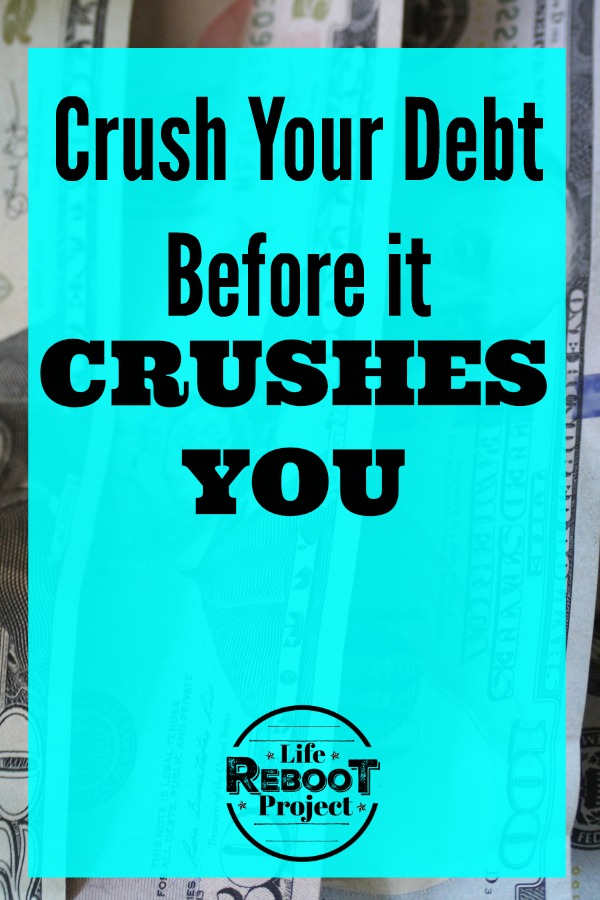
Debt relief is more of a problem than just about money. In an article presented by Psychology Today, debt is linked to depression and suicide. I’m going to argue it is not only a problem of debt.
It is ultimately a problem of control and being trapped doing something that conflicts with what people most value in life.
My debt never got so large that it crushed me. I never felt debt was in control or that I could never pay it down. I never gave debt control of my life.
I got lucky. I sat down when I first started seeing it get out of control and set out a plan to pay it down. I’m not going to say it wasn’t painful though.
My pain came from watching money go out the door unnecessarily on interest. I saw the interest charges on my statements and knew they were useless.
Every time I worked overtime at my job, I knew that the time I put in was going to pay down the debt instead of going to help me build my wealth.
It was an empty feeling, but I still saw the light at the end of the tunnel. I never let it beat me mentally.
I think the larger question we need to look at is the pressure we get put under by the systems in our society.
The pressure of doing work we don’t like or for companies for which we don’t like working.
Debt relief; Forced to continue to work for money you can’t spend.
We like to know that when we go to work and put in the time, the money we take home we can use to live our lives and build wealth to get to a point where we no longer have to work.
Like my case where I was working overtime every week and knowing that time was going right out the window as interest charges. It was tough because, at that time, I was in a job I didn’t enjoy.
The money was good.
I stayed there because being in debt meant I couldn’t quit. I couldn’t take time off to look for another job.
I spent every paycheck on interest and bills before I even got it in my hands.
Quitting and not being able to find a job could mean more debt.
When I did find another job, I would be further in the hole than I was in before.
It was the pressure of the job that gave me the wake-up call to pay down the debt.
I hated that job so badly; I planned to keep my head down and keep working until the debt was paid off. Then phase two was to create an emergency fund to allow me the freedom to quit that job and stay out of debt.
The plan was my savior.
The plan kept my sanity and kept the depression at bay.
Had my debt been more significant or I didn’t have an action plan, I can see how it would have led to deeper depression or even thoughts of suicide.
Debt is an unusual beast.
It creeps up on you.
Things feel good, and everything seems payable when everything is rolling along. Once it catches up with you, and you finally notice there is a problem, it can be a crushing blow.
Debt relief; The pressure of debt compounds the situation to make it harder to figure a way out.
Here is another aspect brought up by the article that I never realized before. The effects of debt can be compounding. Being in debt can lead to mental health problems.
The mental health problems caused by the debt can cause the person in debt not to think clearly enough to understand there is always a plan to get out.
The further the depression and the debt go unchecked the further the problem compounds itself. The solution is to help people in debt early enough before the problem begins to compound itself.
People need a plan and a path to follow out of debt. People need hope before the pressure begins to spiral out of control. Everyone needs to know there is always a way out of debt.
Debt relief; Besides the compounding mental health issue around debt, our spending society promotes debt.
Another problem with debt is that society promotes it. We are continually pushed by advertisers, the media, and even friends and family to ‘get out there and spend.’ They say spending drives the economy.
It almost becomes a guilt trip if you are not spending. ‘If the money isn’t there, just put it on a credit card.’ This is so very wrong. If depression and suicide are so closely linked with the debt problem, are we as a society responsible for our depression and suicide rate?
No one, of course, wants to take the blame for it. Everyone wants to point the finger in another direction, but aren’t we all somewhat responsible for just being part of society? Is it possible a time will come when financial responsibility gets promoted through our media outlets as intensely as the products we push now?
Unfortunately, I don’t see something like this coming anytime soon.
Debt relief; Bankruptcy is the final way out of debt before it buries someone in depression or leads to suicide.
I’m not an advocate of bankruptcy, but before it drags someone into deep depression or even suicide, it is always an option.
For years’ student loan debt was always exempt from bankruptcy, except in certain extenuating circumstances. You had to prove extreme hardship and a complete inability to repay the loan.
There is talk that these guidelines will begin to soften or at least become more clearly defined, but for now, it looks to remain very difficult for people to have a way out of their student loan debt.
So, what is the solution for someone saddled with a ton of student loan debt? Again, a clearly defined monthly repayment plan. Debt only becomes crushing when someone can’t see a way out.
If you only have federal student loans, you will probably be eligible for one of the three types of government repayment options. If you have private loans, there are options like refinancing or some private loans that have similarly tiered repayment really close to the government plans.
Either way, there is always a way out of debt.
Debt relief; There are people repaying tons of debt every day, a solution is always possible.
Just search Pinterest or any social media platform, and you’ll find case after case of people who have paid off large amounts of debt and even become financially independent.
One example is Michelle Schroeder-Gardner’s Making Sense of Cents blog. She paid off $38,000 in student loan debt in only seven months.
Or, Brandon at Cleared for Success paid off $21,000 of debt in six months.
If you are stuck in debt, before it drags you into depression, jump on the web and do a search for other people who have managed a way out and even sprung back to make more money than they ever dreamed.
So, what is a solution? The best solution is to not fall into the trap in the first place. But, the pull of peer pressure and our spend crazy society can be tough to overcome. The first step is to have it firmly planted in your mind that debt is workable.
There will always be a solution. The second step would be to figure out a good working plan. The third step comes from everyone working together to shed light on this problem and bring a focus to financial education.
I think we always knew debt was a serious problem, but now that the depression and suicide rates seem so closely connected to debt, something needs to be done now.
Till next time, be safe.
Kevin

